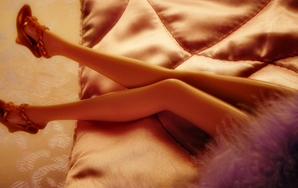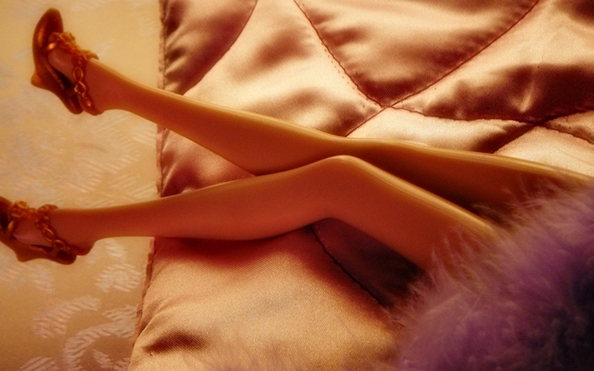
How To Not Be A Slut
When you hear the word hissed across a bar as another girl parades by in a red dress and full confidence, it is not really this woman that the speaker hates. It is herself.

I remember when I was in high school, and virginity was everything. It wasn’t a universal positive to be a virgin, of course, but it was an axis around which the rest of your social life and reputation was going to turn. There was scorn heaped on girls on both sides of the divide, but it was important that you stake your claim. If you were a virgin, you were destined to be a “prude” whose inability to get laid almost certainly stemmed from your A) Chronically closed (and therefore useless) legs, or B) Complete physical undesirability. There was something humiliating about still being a virgin, especially when you were with a boyfriend and thus assumed to be unwilling to “put out.” It was your duty, after all.
Then, if and when you lost your virginity — and it always became known, in some way or another — you were tainted. You had let some guy get into your panties and, unless the sex was in the most ideal circumstances, surrounded by white rose petals and with the boy you had been dating for the past two years without pause, it was dirty. Immediately, aside from the long line of suitors who assumed that you were indiscriminate about your sexual dalliances once you had been “opened for business,” a thousand assumptions were made about who you were. Err too far to one side or the other of the path of sexual acceptability, and you were swiftly labeled a slut.
We were kids, and kids are cruel. That’s true. The labeling and categorizing and prying is certainly not as open or as intense as it was when all of you were locked up in the same building five days a week, but it is still palpable. The underlying perceptions that drove the tense social games surrounding sex at 16 are still in effect at 24, if only more insidiously.
I remember the way it made me hate other women. The thing was that, the higher the premium on all of our individual sexuality at that age, the more intense the competition for male approval. I let the cruelly judgmental words “slut,” “whore,” or “loose” slip from my mouth like a kind of poison, hoping it would settle on the girls whose morals felt too far out of line for the tastes of teenage politics. She kissed my boyfriend, she slept with every guy in the group, she did it in the back of her car parked in front of the school. These were all indiscretions which we felt, on some inexplicable level, offended us personally and eroded our collective image.
I still fight the reflex, from time to time, to judge another woman for how she enjoys and expresses her sexuality. I still wonder, when someone asks my number (even though it is clearly none of their business) if it is sufficiently low, or if I should try to adjust it. I still hesitate before I talk about things which have to do with sex and my body, because we learned that it’s not really a woman’s place to be revealing those things. They are skins we must shed, cocoons we must emerge from as much more evolved, compassionate human beings. And we are working actively on getting rid of the words that underscore them. We know what slut-shaming is, and why it’s bad. This is good, and a step in the right direction.
But the words are, at a certain point, just words. There are much more powerful concepts which lie beneath them, ideologies which make a woman her own harshest critic. Even if we can teach one another not to call another girl nasty names, or convince her that there is no such thing as having too much sex (as long as it’s healthy and consensual), how do we make her feel that she is in charge of her own body? Because the truth is that “slut” and the ideas that surround it only exist in girls who are insecure, at the end of the day, with themselves. When you hear the word hissed across a bar as another girl parades by in a red dress and full confidence, it is not really this woman that the speaker hates. It is herself. She was raised to believe that her worth is tied into that woman’s, and that wearing too tight of a dress or drinking one drink too many was going to erode it.
Getting women to see one another as free agents who can do whatever they like, as long as they aren’t hurting others, and be free of moral judgments is one thing. But the beginning of that really lies in getting women to see their bodies as something that is alive and vibrant and deserves every bit of happiness and pleasure that it wants to seek out. We must learn that sexuality and joy are not some finite quantities that we won’t have enough of if another woman takes too much. We can create our own, and transform it, and make enough for everyone we fall in love with (even for just one night). Seeing ourselves as the source of our own pleasure and guides of our own journey through sexual development is the start to the end of “slut,” because the word doesn’t mean anything if it is not used as a value judgment. When every woman is happy with what sex means to her, there will be no use for such a concept, but not before.
There is no way to not be a slut. There is only a way to embrace sex on your own terms, to the point where you are no longer offended by someone else choosing a different path. If I could go back today and talk to my 16-year-old self, terrified by sex and not sure of what could possibly be expected of her, I would tell her to forget about what boys want. I would tell her to forget about what other girls are going to say, because any who will talk are only unhappy about themselves (just as she is). I would tell her to focus on making strong friendships, and being closer with her family, and taking her time in anything she wants to do. Because the only cure to “being a slut” is happiness, and only because it makes us realize that such a silly thing doesn’t exist in the first place. ![]()











